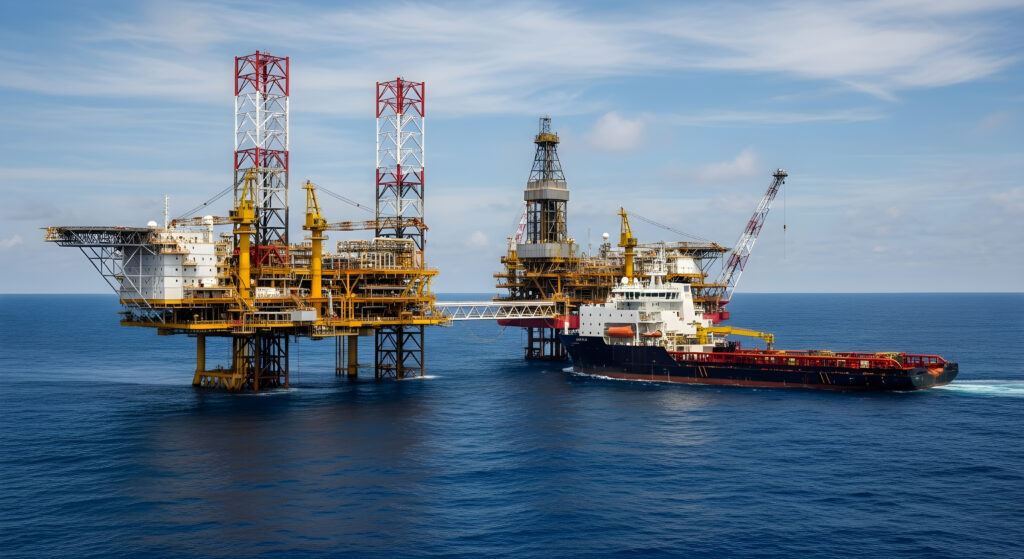Shipbuilding and Offshore installations
Highly automated complex electrical and hydraulic systems are at the heart of modern plant technology.
in shipbuilding and offshore installations. Intensive testing of these components also
Virtual commissioning (VC) ensures autonomous and therefore necessary long-term operational reliability.
The vast majority of automation components used in offshore installations – for machinery and equipment in shipbuilding and for offshore installations – must be certified and have approval for use in harsh offshore conditions. The reason for this is, on the one hand, the necessary proof of durability and functional reliability of all components under extreme environmental conditions and, on the other hand, the proof of high reliability, as repair work at sea is very complex and cost-intensive.
For the same reasons, the use of WinMOD to ensure the operational safety of automation software through a VC is becoming increasingly important. The ability to test automation systems with every conceivable operating and fault scenario, thereby making the software robust enough for use at sea, justifies the effort required for more intensive and systematic software testing processes.
Typical areas of application include civil and military shipbuilding as well as mechanical engineering for various offshore installations, including wind farms, gas and oil production facilities, and underwater stations.

Further process automation solutions
Typical processes that carry out continuous or batch conversion of substances.
They are divided into main and auxiliary processes.
The aim is the economical and safe fabrication of basic materials or specialised products for all industrial sectors.
Similar production processes are used as in the chemical/pharmaceutical industry, but the core here is the use of microorganisms, cell cultures or enzymes for the fabrication of products.
In future, it will be used in various areas such as pharmaceuticals, green energy and green chemistry.
The focus is on processing, preserving and refining agricultural and raw materials. Typical processes include material- and energy-oriented product manufacturing, often combined with strict quality and hygiene standards.
All processes involved in the extraction and processing of raw materials (coal, ores, salts, earths) and their conversion into basic industrial products (steel, cement, gypsum, various other building materials). These processes are usually very energy-intensive.
Refrigeration machines for cooling and system components for cooling distribution and utilisation are a key factor in both industrial plants and building automation.
Energy generation plants based on fossil fuels (coal, gas, oil), nuclear power plants and increasingly promising variants based on environmentally friendly resources such as hydropower, solar, wind, tidal, etc., as well as energy distribution plants, are becoming increasingly highly automated with extreme demands on their availability.
Water supply, from extraction, treatment, storage and distribution, as well as wastewater disposal, including transport, storage and treatment for environmentally sound disposal, are fundamentally important for a modern society and its industry.
Technical installations in road transport (general traffic control, tunnels, bridges), rail transport (signalling and switch systems, signal boxes, etc.) and waterway transport (locks, weirs, ship lifts)
All areas of technical building equipment such as ventilation, heating, air conditioning, security and fire protection that aim to improve energy efficiency, comfort, safety and cost-effectiveness in buildings.
General shipbuilding for civil, technical and military use, offshore installations as bases for wind farms, gas and oil production facilities, and underwater stations.